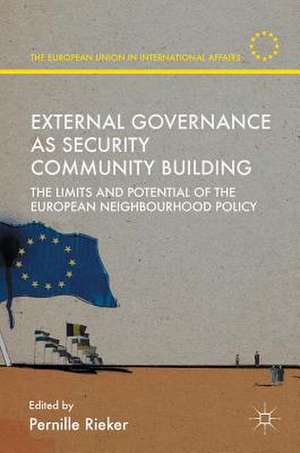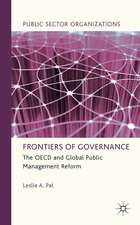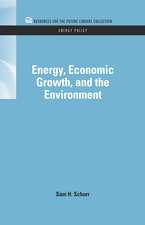External Governance as Security Community Building: The Limits and Potential of the European Neighbourhood Policy: The European Union in International Affairs
Editat de Pernille Riekeren Limba Engleză Hardback – 9 mai 2016
Din seria The European Union in International Affairs
- 15%
 Preț: 695.53 lei
Preț: 695.53 lei - 15%
 Preț: 499.12 lei
Preț: 499.12 lei -
 Preț: 351.66 lei
Preț: 351.66 lei -
 Preț: 392.60 lei
Preț: 392.60 lei - 18%
 Preț: 779.08 lei
Preț: 779.08 lei - 18%
 Preț: 1005.74 lei
Preț: 1005.74 lei - 15%
 Preț: 640.59 lei
Preț: 640.59 lei - 18%
 Preț: 787.61 lei
Preț: 787.61 lei - 18%
 Preț: 783.98 lei
Preț: 783.98 lei -
 Preț: 389.70 lei
Preț: 389.70 lei - 18%
 Preț: 778.76 lei
Preț: 778.76 lei - 18%
 Preț: 725.75 lei
Preț: 725.75 lei - 9%
 Preț: 679.86 lei
Preț: 679.86 lei - 15%
 Preț: 639.90 lei
Preț: 639.90 lei - 15%
 Preț: 639.90 lei
Preț: 639.90 lei -
 Preț: 389.70 lei
Preț: 389.70 lei - 18%
 Preț: 944.19 lei
Preț: 944.19 lei -
 Preț: 384.09 lei
Preț: 384.09 lei - 18%
 Preț: 781.77 lei
Preț: 781.77 lei - 15%
 Preț: 584.26 lei
Preț: 584.26 lei - 15%
 Preț: 467.79 lei
Preț: 467.79 lei - 15%
 Preț: 641.71 lei
Preț: 641.71 lei - 18%
 Preț: 898.13 lei
Preț: 898.13 lei -
 Preț: 408.66 lei
Preț: 408.66 lei - 18%
 Preț: 782.72 lei
Preț: 782.72 lei - 18%
 Preț: 784.79 lei
Preț: 784.79 lei -
 Preț: 384.09 lei
Preț: 384.09 lei -
 Preț: 390.63 lei
Preț: 390.63 lei -
 Preț: 382.36 lei
Preț: 382.36 lei - 15%
 Preț: 640.71 lei
Preț: 640.71 lei - 15%
 Preț: 642.36 lei
Preț: 642.36 lei
Preț: 387.75 lei
Nou
Puncte Express: 582
Preț estimativ în valută:
74.20€ • 77.66$ • 61.75£
74.20€ • 77.66$ • 61.75£
Carte tipărită la comandă
Livrare economică 31 martie-14 aprilie
Preluare comenzi: 021 569.72.76
Specificații
ISBN-13: 9781137561688
ISBN-10: 1137561688
Pagini: 218
Ilustrații: XVI, 218 p. 9 illus. in color.
Dimensiuni: 148 x 210 x 18 mm
Greutate: 0.41 kg
Ediția:1st ed. 2016
Editura: Palgrave Macmillan UK
Colecția Palgrave Macmillan
Seria The European Union in International Affairs
Locul publicării:London, United Kingdom
ISBN-10: 1137561688
Pagini: 218
Ilustrații: XVI, 218 p. 9 illus. in color.
Dimensiuni: 148 x 210 x 18 mm
Greutate: 0.41 kg
Ediția:1st ed. 2016
Editura: Palgrave Macmillan UK
Colecția Palgrave Macmillan
Seria The European Union in International Affairs
Locul publicării:London, United Kingdom
Cuprins
1.Introduction: The European Neighbourhood Policy: An instrument for security community-building - Pernille Rieker.- 2.Extending the EU’s Security Community amidst Conflict: The Case of Ukraine - Jozef Batora and Matej Navratil.- 3.The EU’s Eastern Partnership with Moldova: A ‘best-case’ scenario for EU security community-building? - Giselle Bosse and Dorina Baltag.- 4.Building a Security Community in the EU’s Neighbourhood? Experiences from Georgia - Ketevan Bolkvadze and Bidzina Lebanidze.- 5.Security Community-Building in Times of Crisis: Morocco, the ENP, and Practices of Mutual Responsiveness - Niklas Bremberg and Pernille Rieker.- 6.The EU Quest for a Security Community with the Southern Neighbours: EU-Tunisia relations - Assem Dandashly.- 7.Jordan, the European Neighbourhood Policy, and Commonalities of Interest: Building a Security Partnership rather than a Security Community - Peter Seeberg.- 8.Comparisons and Conclusions - Pernille Rieker
Notă biografică
Pernille Rieker is Senior Researcher at the Norwegian Institute of International Affaris (NUPI), Norway, and holds a doctoral degree from the University of Oslo. Her research interests are related to international and regional security, European integration and external governance as well as national foreign and security policy with a special focus on the Nordic countries and France. She has published widely on these issues.
Textul de pe ultima copertă
The European Neighbourhood Policy (ENP) was initially intended to create ‘a ring of friends surrounding the Union, from Morocco to Russia and the Black Sea’ (Prodi, 2002). Today, however, the ever-worsening security situation in the region clearly shows that the aim has not been achieved. With wars in Ukraine, Syria and Libya, the Union’s neighbourhood can therefore better be described as ‘a ring of fire’. Does this means that the policy has failed and that an alternative policy towards the EU’s neighbours is needed? Or should these developments be seen as temporary setbacks caused by external factors beyond EU control? By comparing the EU’s approach to its eastern and southern neighbours, this volume seeks to answer such overarching questions. The authors find that the EU still has a potential role to play in providing regional security, but that this role also risks being increasingly undermined if it does not increasingly take into account the broader geostrategic realities in both regions.















